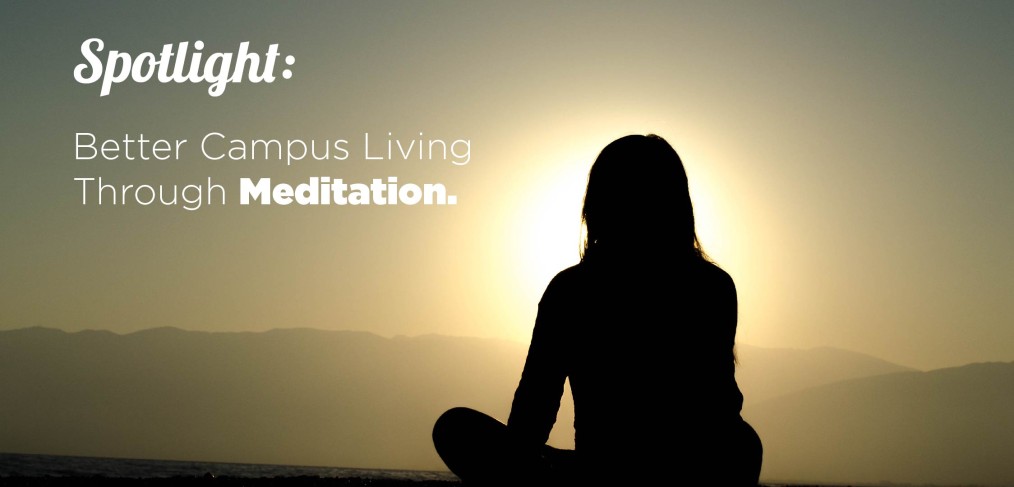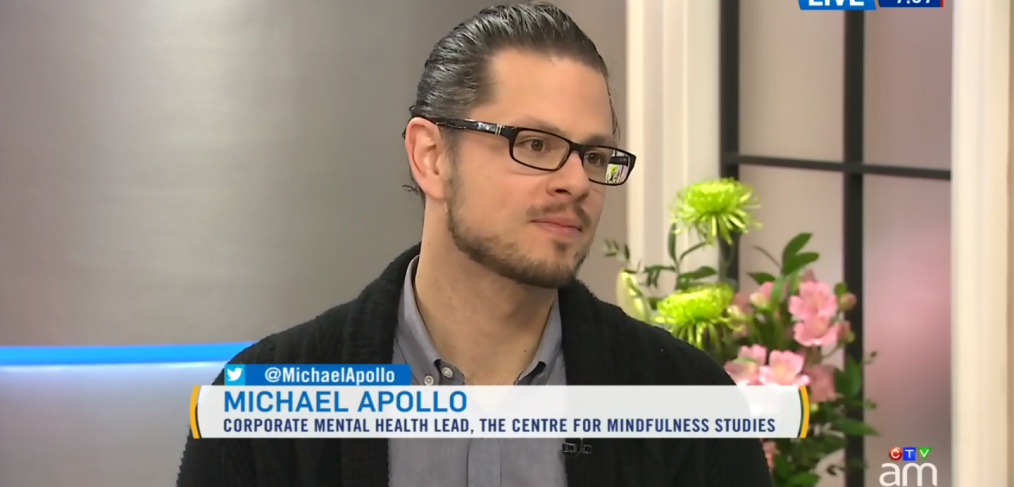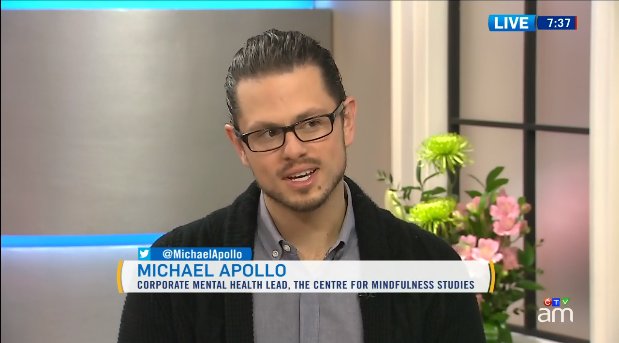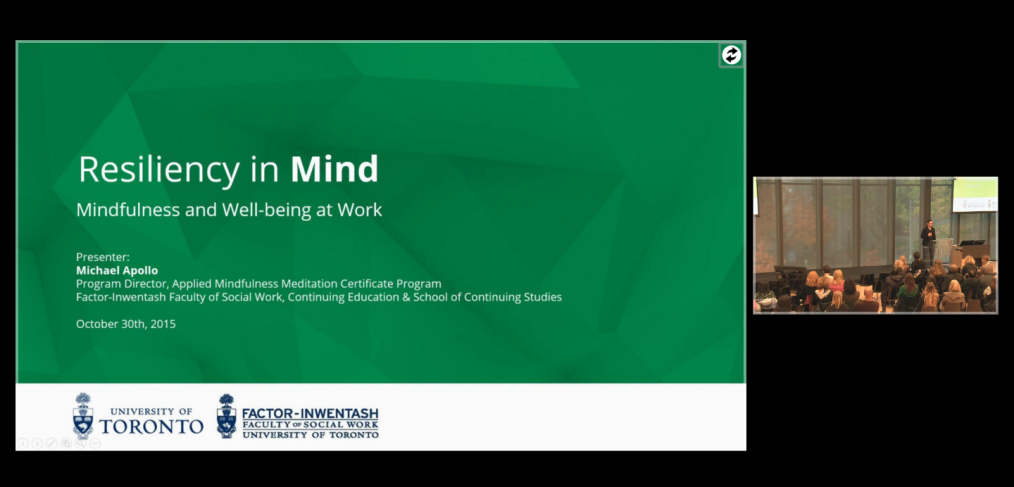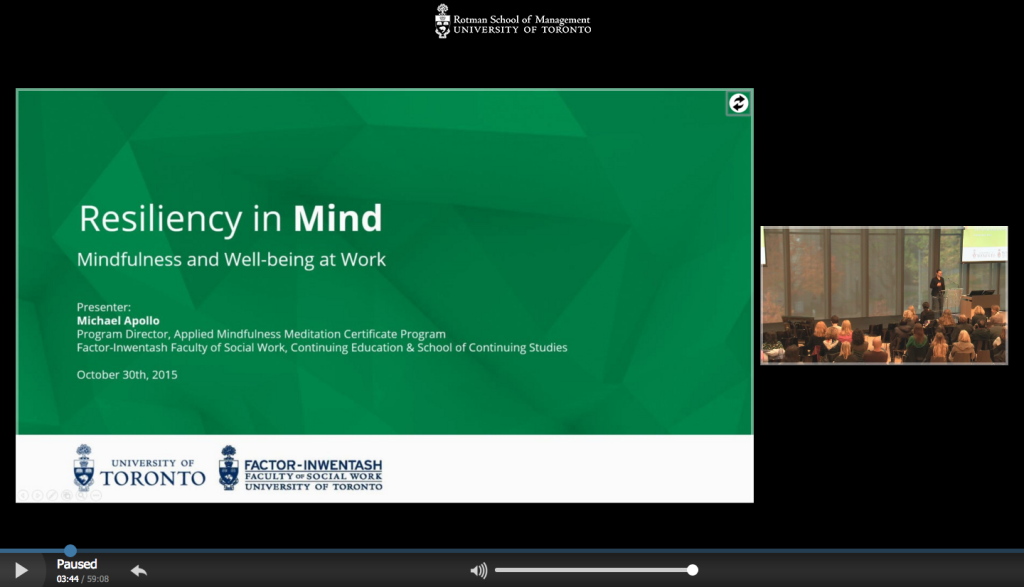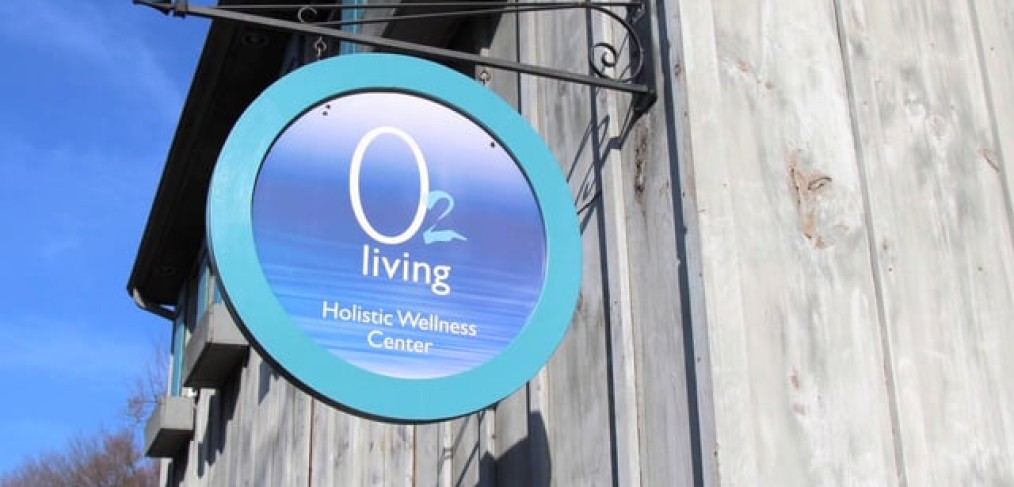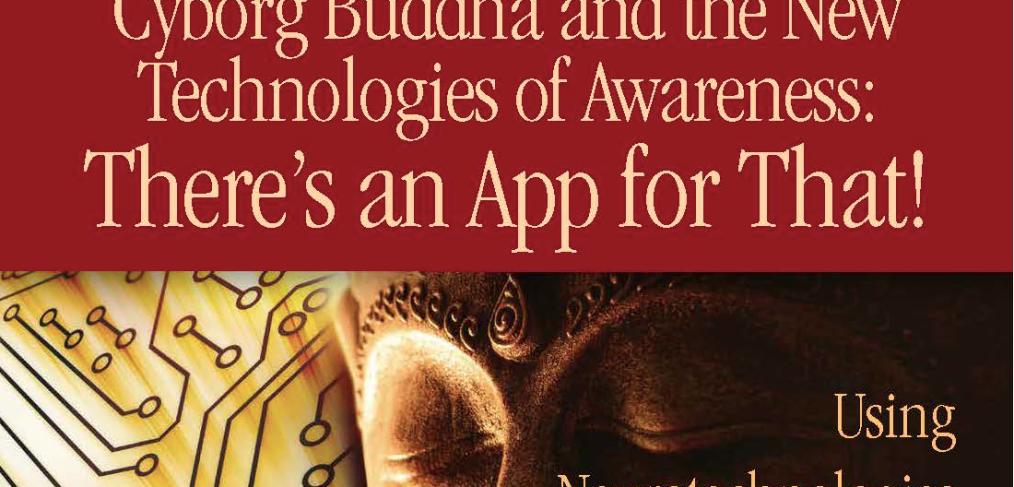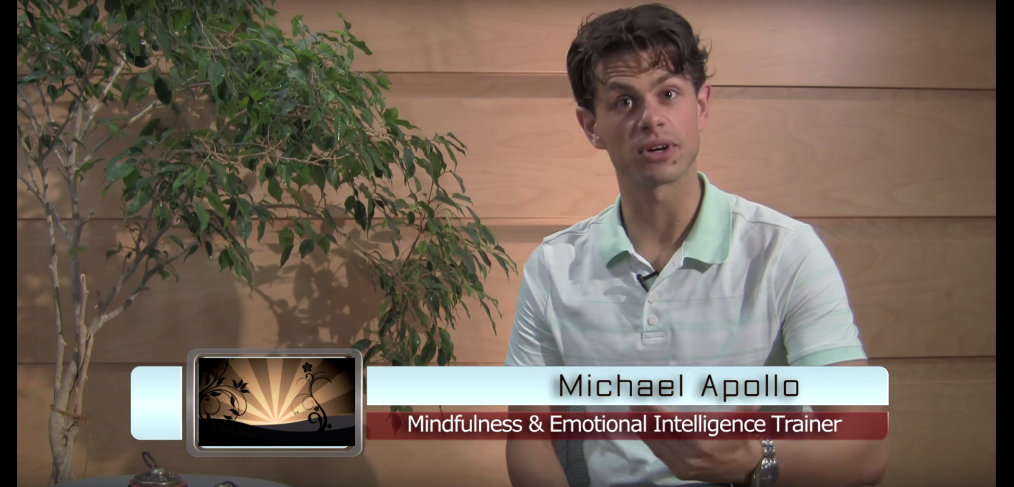What mindset is needed to lead a transformation? In this keynote at the Bell Network Leadership conference, Michael Apollo shares the practice and research of mindfulness for executives and workplace leaders in the midst of transformation.
On February 15th, 2017 the Centre for Innovation in Campus Mental Health, a partnership project with the Canadian Mental Health Association interviewed Michael Apollo. View the abstract below or click here to read the full article and interview.
Over the last decade, the practices of Mindfulness and Meditation have enjoyed a substantial shift in public perception. Once unfairly lumped-in with New Age philosophy and eastern mysticism, Mindfulness and Meditation have been riding a sea change towards the mainstream, now rigorously supported by ever-growing bodies of scientific study, and vocally supported by vast numbers of practitioners and students who swear by the practices’ capacity to alleviate stress, anxiety, and depression.
That isn’t to say the message is out. As levels of stress, anxiety, and depression continue to rise across North America – and at worrying rates on post-secondary campuses nationwide – there’s much more to be done in order to raise the profile of Mindfulness and Meditation as a self-directed alternative to pharmaceuticals, expensive therapy, or perhaps more worrying – nothing.
In order to help spread the word, The Centre for Innovation in Campus Mental Health is focusing this month’s Spotlight on the Mindfulness Meditation program at the University of Toronto, speaking with Michele Chaban, the outgoing Director of the Mindfulness Meditation program, and the incoming Director, Michael Apollo Chabior.
With meditation quickly becoming mainstream, there is a flurry of mobile apps and technology supporting this rising demand. With all that is out there it may be difficult to know which pieces of technology to bring into your life. In this Canada AM segment CTV asked me to share with viewers my top tips and picks.
Full Blog – Tech-assisted meditation vs. the human experience
Our daily lives are becoming more complex, connected and challenging, putting our general population under an immense amount of pressure. The result is more stress than we’ve ever faced before. So what can we do about it? Enter meditation.
Meditation in short means “mind training”. It is a practice that helps us better understand our own mind and strengthen skills like attention and compassion. There are many forms of meditation out there. Some are rooted in ancient practice and years of research, and some have been created more recently. When starting meditation it’s important to know which practice you are doing.
Historically, meditation has been taught through a highly trained teacher, whereas today, the fast pace of modern life has left many time-starved and looking for more efficient and easily accessible options. This is where mobile meditation apps come in. While both ways of exploring meditation have their benefits, there are a few key differences.
Apps are emerging as an easy way to experience meditation. Most focus on giving the minimum dose of meditation, suggesting that from just a few minutes of practice a day, you’ll have increased happiness and a better life. Some apps have been built with the expertise of researchers and experienced teachers, while others have not. While there isn’t yet a large amount of research on the long term effect of apps, many users report feeling the benefits like reduced stress, greater clarity, enhanced attention, and more.
Here are my top meditation app picks:
Interested in meditation technology? Here are my top picks:
From my experience, the difference between using a meditation app or meditation technology versus learning with a teacher or group is significant.
For example, a teacher can share their experience with you. They can listen to the challenges you are having and share advice. When you meditate in a group, there is a feeling of community that can help motivate you to practice. All of this is important to help us maintain a meditation practice. Meditation programs are available in most major cities. In these programs, participants develop a practice over time by meeting weekly in a group with an experienced teacher.
One of the most researched meditation programs called MBSR or the Mindfulness-Based Stress Reduction program is delivered over eight weeks. Research is pouring out about the health benefits of taking this program, showing outcomes like reduced stress and chronic pain, increased immunity and even enhanced cognitive abilities like attention and memory.
To develop positive habits, build new skills or simply just to take care of ourselves, in my opinion, nothing beats an experienced guide and a supportive community.
However, apps can be a great introduction and start to the journey of finding a teacher or community you connect with.
Either way, whether choosing to practice through a meditation program or an app, it is important to research the experience of the teachers. Just like with exercising the body, you need a skilled trainer to exercise the mind.
My Tips for using Meditation Apps:
- Carve out a time in the day that works for you to practice, even if it’s a few minutes in the morning or before bed.
- Create a beautiful space in your home to practice – it can be as simple as clearing a small area for a chair or cushion and a candle
- Clarify your your intention and ask yourself “Why do I want to meditate?”
- Try out a few different meditation apps, read the bios of the teachers and get to know the intention behind the practice to see if it is the right one for you.
*Please note that this blog article is a revised version to the one posted on the CTV website and includes the Meditation Studio App and Muse: Brain Sending Headband which are two products i’ve supported in design and development.
Canada’s Healthy Workplace month was held over October and University of Toronto’s Organizational Development and Learning Centre, and the Work-Life Advisory Committee invited Michael Apollo to host the Closing Keynote address at Rotman Business School. Click here to view the keynote.
The Keynote was titled Resiliency in Mind and engaged the audience to reflect back to when they began working, how they felt at this time and how easily the mind shifts perspectives when we are placed into a rapidly changing workplace environment. The neuroscience of stress and mindfulness was explored including the use of mindful awareness to help see clearly what assumptions and perspectives we place upon challenging situations and how we can skillfully respond to whatever is happening. Self compassion was also discussed as a key practice to help stay resilient by targeting the relationship we have with our selves and others to optimize our effectiveness in any given moment.
For more information about all the events held at University of Toronto click here.
Work. Home. Family. Relationships. How do we balance it? And more importantly, how do we make sure not to miss a moment of what’s actually happening, instead of worrying about what tomorrow holds in store?
So, how do we make ourselves present? How do we focus on what’s right in front of our faces instead of turning to our smart phone every 5 minutes for news about upcoming events and who’s doing what where at any given point in time?
“It’s simple, but it’s not easy,” says Michael Apollo, Program Director of the Applied Mindfulness Meditation Certificate Program at the University of Toronto Factor-Inwentash Faculty of Social Work. Apollo has been personally training in meditation and mindfulness for over 13 years and now dedicates his life to helping others use mindfulness as a tool in the workplace and the home. The end goal? Be happy and suffer less.
Click here to read this interview with Michael Apollo
With mindfulness currently being adopted en masse there are still populations living on the “fringe” of mainstream society within which contemplative practice is difficult to access. This lecture at Smiths College, part of their Cyborg Buddha series, explores the barriers to entry, emerging technologies and how the Muse technology could support the further democratization of contemplative practice and mindfulness in our society.
We live in an age of nonstop “busyness” were technology is a natural part of our everyday lives, leading to distraction and a sense of disconnect for many caught in the hustle of it all. Is there a way to use technology to help us live more balanced and connected lives?
http://www.huffingtonpost.ca/michael-apollo/technology-mindfulness_b_4031145.html
Part of UHN’s wellness and resilience initiative, OASIS a health and wellness division of UHN developed a 4-part video series to openly share on the internet and to UHN staff. The video series has had over 50,000 views.
https://www.youtube.com/watch?v=28lARV5zYXA
Our business landscape is shifting dramatically. Decision making and interactions between clients and colleagues is often challenged with volatility, uncertainty, complexity and ambiguity. Leaders now need to constantly adapt their leadership style to suit the needs of the novel situations they are in, and mindfulness can help.
http://www.huffingtonpost.ca/michael-apollo/business-mindfulness_b_5531846.html

